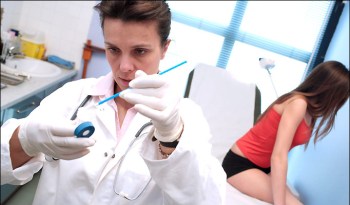Osteoporosis, pregnancy and domestic violence are pertinent issues for queer women as well and therefore these issues should – in theory – should be raised while at the gyno.
 However, not all experiences reported were negative. A reader wrote that when she informed her gynecologist that she was having sex with both men and women, the gyno “went on her merry swabbing way, totally void of shock or disgust or interest in any kind.” Another reader spoke about the open and inclusive nature of her Uni’s clinic, stressing that sexual orientation is explicitly and openly asked for on the pre-evaluation form, allowing the “gynecologist to tailor services appropriately.”
However, not all experiences reported were negative. A reader wrote that when she informed her gynecologist that she was having sex with both men and women, the gyno “went on her merry swabbing way, totally void of shock or disgust or interest in any kind.” Another reader spoke about the open and inclusive nature of her Uni’s clinic, stressing that sexual orientation is explicitly and openly asked for on the pre-evaluation form, allowing the “gynecologist to tailor services appropriately.”
An Alternative
While the medical community has begun to address the need to include sexual orientation and gender identity in medical training; discrimination, ignorance and homophobia continue. Proper training (i.e. inclusive, non-heteronormative) is essential, obviously; however, radical shifts in societal views on gender, sex and sexuality must also take place. And you, lovely readers, can make this happen!
Demand equal and respectful treatment and if you do not receive it, speak up.
So, what can you do to help spur change, to confront these binary restrictions head on? Go to the gyno! Be honest and open (this can be uber hard…but we’ve gotta!), demand equal and respectful treatment and if/when you do not receive it, speak up. Obviously, you guys are all amazing and out there doing your thing each and every day.
Here is some information to help you take action in this specific realm:
First, if you haven’t and need to, go to the gyno! Find one that is queer friendly with the Gay and Lesbian Medical Associations’ Find a Practitioner search. You can also check out the Human Rights Campaign’s healthcare equality index, which scores practitioners/institutions in regards to their LGBTQ friendliness. You can find it here.
Get informed on the issues that queer individuals often face in regards to healthcare and report doctors who violate equality or who practice discrimination. These sites offer comprehensive information on queer health related issues and information on how to speak up when your rights are violated.
- Reality Check – a community and publication serving individuals and organizations committed to advancing sexual and reproductive health and rights – has a section on LGBTQ issues in healthcare. You can access it here.
- Women’s Health. gov – the US government’s source for healthcare information for women – offers comprehensive information on a variety of topics, including lesbian health. You can access it here.
- The Mautner Project – the National Lesbian Health Organization – improves the health of lesbians, bisexual, and transgender women who partner with women, and their families, through advocacy, education, research, and direct service. Visit them here.
- You can also visit the Gay and Lesbian Medical Association for general information on queer health.
If you experience discrimination from your healthcare provider because of your sexual orientation, you can contact several organizations, which, if not able to help you directly, can often direct you to other organizations/resources that can.
- The Lamda Legal Defense and Education Fund provides amazing resources on queer rights in general and can help you with discrimination concerns or direct you to the right place.
- The American Civil Liberties Union has a Lesbian, Gay, Bisexual and Transgender Project; you can contact them and report discriminatory practices.
- The National Gay and Lesbian Task Force has a great section on health issues and can be contacted here. And the Equality Federation – the national alliance of state-based lesbian, gay, bisexual and transgender advocacy organizations – can be contacted here.
- I found this general site while procrastinating writing this article: Report Discrimination Online ….it’s a listing of organizations that work to prevent discrimination in all forms and assist you if you face it.
Many of these organizations have robust advocacy, “take action” and volunteer programs, as well. Get involved!
Also, you could become a gynecologist and begin your own queer friendly practice. YAY!
 One reader/commenter asked this very simple, yet brilliant question: If women had been instrumental in the development of gynecological practices, what would those practices look like? She answered herself: “Well, we wouldn’t have to be flat on our backs and/or in stirrups, feeling prone, vulnerable and violated. There would be some power given to the woman being examined whereby she had the upper hand … Perhaps some sort of tennis umpire’s chair where the woman could be sat normally in a gown and the doctor would have to be disadvantaged by having to step down into a mechanics-style inspection pit beneath to look up and check all was okay via a hole in the seat!”
One reader/commenter asked this very simple, yet brilliant question: If women had been instrumental in the development of gynecological practices, what would those practices look like? She answered herself: “Well, we wouldn’t have to be flat on our backs and/or in stirrups, feeling prone, vulnerable and violated. There would be some power given to the woman being examined whereby she had the upper hand … Perhaps some sort of tennis umpire’s chair where the woman could be sat normally in a gown and the doctor would have to be disadvantaged by having to step down into a mechanics-style inspection pit beneath to look up and check all was okay via a hole in the seat!”
Amen to that!
Mooooo for now!
P.S. My sincerest apologies for the major delay in this piece. I have been swamped at my other two jobs and have – much to my and Riese’s dismay – put the one thing that I am actually excited about (this blog) on the backburner. Waaaaaaa! I am so sorry. On a separate note: Daphne, one of the brilliant interns, has helped tremendously with the research for this piece. Thanks!
